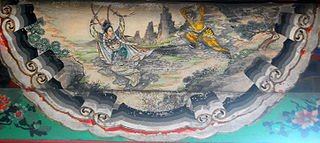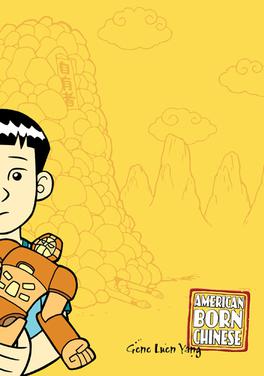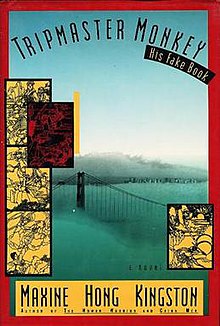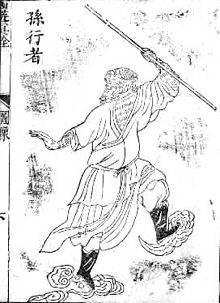
Maxine Hong Kingston is an American novelist. She is a Professor Emerita at the University of California, Berkeley, where she graduated with a BA in English in 1962. Kingston has written three novels and several works of non-fiction about the experiences of Chinese Americans.

Sun Wukong, also known as the Monkey King, is a literary and religious figure best known as one of the main characters in the 16th-century Chinese novel Journey to the West. In the novel, Sun Wukong is a monkey born from a stone who acquires supernatural powers through Taoist practices. After rebelling against heaven, he is imprisoned under a mountain by the Buddha. Five hundred years later, he accompanies the monk Tang Sanzang riding on the White Dragon Horse and two other disciples, Zhu Bajie and Sha Wujing, on a journey to obtain Buddhist sutras, known as the West or Western Paradise, where Buddha and his followers dwell.

Journey to the West is a Chinese novel published in the 16th century during the Ming dynasty and attributed to Wu Cheng'en. It is regarded as one of the great Chinese novels, and has been described as arguably the most popular literary work in East Asia. It is widely known in English-speaking countries through Arthur Waley's 1942 abridged translation, Monkey.

Gerald Robert Vizenor is an American writer and scholar, and an enrolled member of the Minnesota Chippewa Tribe, White Earth Reservation. Vizenor also taught for many years at the University of California, Berkeley, where he was Director of Native American Studies. With more than 30 books published, Vizenor is Professor Emeritus at the University of California, Berkeley, and Professor of American Studies at the University of New Mexico.

Ruyi Jingu Bang (Chinese: 如意金箍棒; pinyin: Rúyì Jīngū Bàng; Wade–Giles: Ju2-yi4 Chin1-ku1-pang4), or simply Ruyi Bang or Jingu Bang, is the poetic name of a magical staff wielded by the immortal monkey Sun Wukong in the 16th-century classic Chinese novel Journey to the West.

Monkey: A Folk-Tale of China, more often known as simply Monkey, is an abridged translation published in 1942 by Arthur Waley of the sixteenth-century Chinese novel Journey to the West conventionally attributed to Wu Cheng'en of the Ming dynasty. Waley's remains one of the most-read English-language versions of the novel. The British poet Edith Sitwell characterized Monkey as "a masterpiece of right sound", one that was "absence of shadow, like the clearance and directness of Monkey's mind." The translation won the James Tait Black Memorial Prize in 1942.

Zhang Jinlai, better known by his stage name Liu Xiao Ling Tong, is a Chinese actor, best known for his role as the Monkey King in the 1986 television series Journey to the West adapted from the classic Chinese novel of the same name. Zhang adopted his father Zhang Zongyi's stage name, Liu Ling Tong, and amended it to Liu Xiao Ling Tong.

Princess Iron Fan is a character from the 16th century Chinese novel Journey to the West. She is one of the most popular Journey to the West villains, alongside her husband the Bull Demon King, her son the Red Boy, and Baigujing.

American Born Chinese is a graphic novel by Gene Luen Yang. Released in 2006 by First Second Books, it was a finalist for the 2006 National Book Awards in the category of Young People's Literature. It won the 2007 Michael L. Printz Award, the 2007 Eisner Award for Best Graphic Album: New, the Publishers Weekly Comics Week Best Comic of the Year, the San Francisco Chronicle Best Book of the Year, the 2006/2007 Best Book Award from The Chinese American Librarians Association, and Amazon.com Best Graphic Novel/Comic of the Year. It also made the Booklist Top Ten Graphic Novel for Youth, the NPR Holiday Pick, and Time Top Ten Comic of the Year. It was colored by cartoonist Lark Pien, who received the 2007 Harvey Award for Best Colorist for her work on the book.
The Monkey King's Daughter is a series of books by author Todd DeBonis for young readers, aged 8 to 12, about the adventures of Meilin Cheng, a 14-year-old Asian-American high school girl who learns she is the daughter of the mythical Sun Wukong — the Monkey King. It is illustrated by John Forcucci. Paul T. Vogel wrote for Midwest Book Review that "'The Monkey King's Daughter' is quite the entertaining read, highly recommended."

Bearheart: The Heirship Chronicles is a 1990 novel by Gerald Vizenor; it is a revised version of his 1978 debut novel Darkness in Saint Louis: Bearheart. The novel is a part of the Native American Renaissance and is considered one of the first Native American novels to introduce a trickster figure into a contemporary setting. Vizenor drew from trickster traditions from various Native American tribes, such as Nanabozho (Anishinaabe) and Kachina (Pueblo).
Griever: An American Monkey King in China is a 1986 novel by Gerald Vizenor. It won the 1986 New York Fiction Collective Award and the 1988 American Book Award. The book is important both because it establishes the trickster figure of Griever de Hocus, whom Vizenor had created in his 1985 story "Luminous Thighs" and whom he would use again in The Trickster of Liberty, and because Vizenor takes Native American stories and themes outside the Americas and into China, establishing a connection to Chinese trickster figures, most notably Sun Wukong the Monkey King.

The Fifth Book of Peace is a 2003 book by Maxine Hong Kingston, published by Knopf. Part-fiction, part-memoir, the book was written in response to Kingston's house fire in 1991 and additionally contains her thoughts about war, specifically the Vietnam War and the Gulf War, among others.
Monkey King, or Sun Wukong, is a main character in the classical Chinese epic novel Journey to the West.

Journey to the West: Conquering the Demons is a 2013 fantasy comedy film co-written and produced by Stephen Chow and co-directed by Chow and Derek Kwok. The movie was first announced in July 2011 and was released on 10 February 2013 in China. The film is a loose comedic re-interpretation of the 16th-century novel Journey to the West, a Chinese literary classic often believed to be written by Wu Cheng'en.

The Monkey King Festival is celebrated in Hong Kong on the 16th day of the eighth Lunar month of the Chinese calendar, corresponding to September according to the Common era calendar, a day after the Mid Autumn Festival. The origin of the festival is traced to the epic 16th century novel Journey to the West written by the Chinese novelist Wu Cheng'en (1500–1582) during the Ming dynasty (1368–1644). The novel brings out the concept of immortality from Taoism and rebirth from Buddhism. The monkey Sun Wukong, a character in the novel, is the featured figure of the festival.

Gods and demons fiction or Shenmo fiction is a subgenre of Chinese fantasy fiction that revolves around the deities, immortals, demons and monsters of Chinese mythology. The term shenmo xiaoshuo, coined in the early 20th century by the writer and literary historian Lu Xun, literally means "gods and demons novel". Representative works of shenmo fiction include the novels Journey to the West and Investiture of the Gods.

Wu Kong (悟空传), also known as Immortal Demon Slayer and The Legend of Wukong, is a 2017 Chinese fantasy-action-adventure film directed by Derek Kwok and produced by Huang Jianxin, starring Eddie Peng, Ni Ni, Shawn Yue, Oho Ou, and Zheng Shuang. It is based on Jin Hezai's internet novel Wukong Biography, which retells the story of Sun Wukong in the classical novel Journey to the West and is partly inspired by the 1995 comedy film A Chinese Odyssey. The film was released in China on 13 July 2017.

I Love a Broad Margin to My Life is a 2011 memoir by Maxine Hong Kingston, published by Knopf.
















